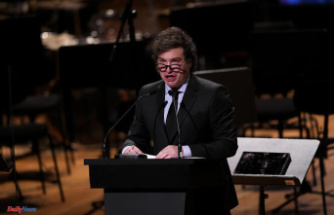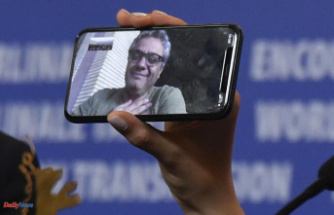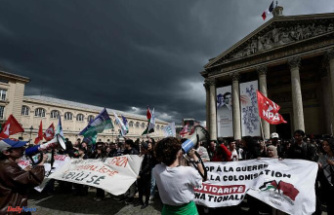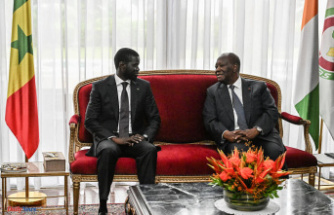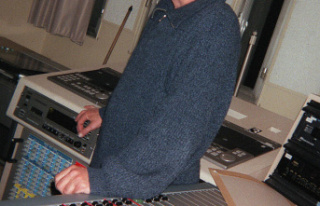At least 130 people were killed and more than 100 injured on Friday evening, March 22, in an attack by gunmen at a concert hall on the outskirts of Moscow.
According to the emergency services, cited by the Interfax agency, a “group of two to five unidentified people wearing tactical uniforms and armed with automatic weapons” “opened fire on security agents at the entrance to the concert hall" of the Crocus City Hall, part of a huge exhibition center in Krasnogorsk, northwest of the Russian capital, then "started shooting at the audience" on Friday evening, before the start of a rock concert.
“The people in the room lay on the ground to protect themselves from the gunfire for fifteen to twenty minutes, after which they began to crawl out. Many managed to get out,” said a journalist from state news agency Ria Novosti.
“Just before the start, we suddenly heard several machine gun bursts and a terrible woman's scream. Then a lot of screaming,” Alexeï, a music producer who was in a dressing room at the time of the attack, told Agence France-Presse (AFP). “Only three or four bursts, then a few more,” he added, reached by telephone. From the dressing rooms where he barricaded himself before fleeing, he was able to observe the panic of the spectators: “People were running towards the stage, terrible crowd movements. »
The perpetrators then allegedly set the building on fire using a “flammable liquid,” the Investigative Committee said on Saturday.
According to the Russian Emergency Situations Ministry, firefighters first managed to evacuate around a hundred people who were in the basement of the concert hall where the Russian rock group Piknik was to perform, whose members could also have been exfiltrated, TASS reported. Operations were then launched, according to the Russian agency, to “save people on the roof of the building, using lifting equipment”. The major fire in the building housing the performance hall “was almost contained” by firefighters, announced Andreï Vorobiov, governor of the Moscow oblast, in the early hours of Saturday. “The roof of the auditorium has collapsed and the removal of the rubble continues,” he explained.
The death toll from the attack rose to 133, the Investigative Committee announced on Saturday afternoon. In a press release, investigators explained that they had found “other bodies while clearing the rubble”. “Search operations are continuing,” they said. “The work will continue for, at least, a few more days,” Andrei Vorobiov wrote on Telegram on Saturday.
A statement published late Friday evening by the Islamic State (IS) organization claimed responsibility for the attack. IS fighters “attacked a large gathering (…) in the vicinity of the Russian capital Moscow,” IS said on one of its Telegram accounts. The jihadist group, which has already targeted Russia several times, claimed that its commando had then “returned to its base safely”.
According to the statement of claim, the attack was carried out by the Islamic State in Khorasan (IS-K) organization, a branch of IS based in Afghanistan, which has already threatened Russia in the past.
“The attack was carried out by four IS fighters armed with machine guns, a pistol, knives and incendiary bombs,” the organization added in a message published on one of its Telegram accounts. IS said the attack came “in the context... of the raging war” between the group and “countries fighting Islam.”
ISIS, which Moscow is fighting in Syria and which is also active in the Russian Caucasus, has already carried out attacks in Russia since the end of the 2010s. But the group has never claimed responsibility for an attack of this magnitude.
The Kremlin announced on Saturday “the arrest of eleven people, including four terrorists involved in the attack.” These four people suspected of being the perpetrators of the attack – “foreign citizens” according to the authorities – were arrested in the Bryansk oblast, bordering Ukraine and Belarus, the Committee subsequently clarified. investigation.
Without mentioning the IS claim, the FSB claimed that the suspects had “contacts on the Ukrainian side” and planned to flee to that country. The authorities have not provided any proof of these supposed links, the nature of which has not been specified. Ukraine has firmly denied any link to the attack and claimed that Russia, whose offensive it has been fighting for two years, was seeking to place the blame on it.
During a televised address on Saturday, Vladimir Putin denounced a “barbaric terrorist” act and declared a day of national mourning on Sunday. The Russian president promised on Saturday to "punish" those responsible for the attack by not mentioning the claim of the jihadist group Islamic State (IS), saying only that the attackers had been arrested on their way to Ukraine.
Vladimir Putin spoke overnight with officials from law enforcement and emergency services. According to Russian news agencies citing the Kremlin, the president received the reports from the director of the FSB, the Investigative Committee, the National Guard, as well as the ministers of the interior, health and emergency situations .
Moscow Mayor Sergei Sobyanin announced the cancellation of all public events. The capital's main museums and theaters have announced their closure. Reinforced security measures have been put in place, according to Russian television, particularly at airports.
The White House said Friday evening that it recently warned Russia of a terrorist attack in Moscow. “Earlier this month, the US government had information about a planned terrorist attack in Moscow, potentially targeting large gatherings, including concerts, and Washington shared this information with Russian authorities,” Adrienne said Watson, spokesperson for the US National Security Council.
A version that Moscow has not confirmed. “If the United States has or had reliable data on this subject, it must immediately transmit it to the Russian side,” reacted Ms. Zakharova on Friday evening regarding the warnings sent on March 7 by the American embassy in Russia. to its citizens regarding the risks of attacks in Moscow. The embassy, followed by its British counterpart, called in particular to “avoid large gatherings, including concerts”, over the next forty-eight hours. Recently, on March 19, Vladimir Putin again mentioned this warning, denouncing “explicit blackmail and a desire to destabilize and frighten our society.”
That same March 7, the FSB assured that it had foiled a planned attack against a Moscow synagogue, attributed to Afghan terrorists linked to the Islamic State organization. A few days earlier, in Ingushetia (North Caucasus), security forces had carried out an all-night assault on a house in the town of Karabulak, killing “six fighters”, according to the authorities.
In 2002, Chechen fighters took 912 people hostage in the Moscow theater of Dubrovka to demand the withdrawal of Russian troops from Chechnya. The hostage-taking ended with an assault by special forces and the death of 130 people, almost all of them asphyxiated by the gas used by the soldiers.


